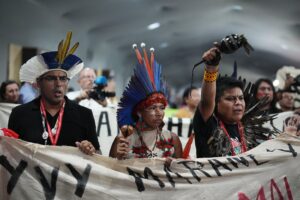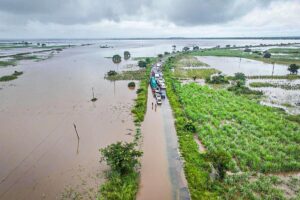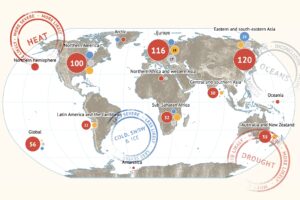Episode 100: Climate Adaptation and Jobs of the Future with Doug Parsons
Our 100th episode of Citizens’ Climate Radio focuses on climate adaptation and how it’s shaping new career paths. Doug Parsons, host of the America Adapts podcast, join us and shares his insights on the urgent need for adaptation and the exciting opportunities in this evolving field. We also hear from an engineering student who reveals how he discovered a new climate-related career path. Plus, we share a special report from the future about unexpected climate solution celebrities.
Doug Parsons on Climate Adaptation
 Doug Parsons explains that while mitigating climate change by reducing emissions is critical, adaptation—preparing for its impacts—is equally important. From wildfires to sea-level rise, communities must adapt to the changes already happening. Doug discusses “managed retreat” and the hard choices ahead for places like Miami, but he also highlights how climate adaptation offers a fast-growing sector full of opportunities for new careers.
Doug Parsons explains that while mitigating climate change by reducing emissions is critical, adaptation—preparing for its impacts—is equally important. From wildfires to sea-level rise, communities must adapt to the changes already happening. Doug discusses “managed retreat” and the hard choices ahead for places like Miami, but he also highlights how climate adaptation offers a fast-growing sector full of opportunities for new careers.
“Adaptation is such an evolving field. If anyone says they know exactly what they’re doing, they’re lying to you. But that’s what makes it so exciting—you can influence it.” —Doug Parsons.
Listen Now!
Why Climate? Featuring Justin Baumann
 We feature Justin Baumann, an engineering management student at Stevens Institute of Technology. Justin shares his journey into climate work, combining his passion for technology and community care. He discusses how climate change initially seemed distant but soon became a central focus in his studies and career aspirations. Attending the Waterfront Alliance’s annual conference opened doors and gave Justin a new understanding of his role in our rapidly changing world.
We feature Justin Baumann, an engineering management student at Stevens Institute of Technology. Justin shares his journey into climate work, combining his passion for technology and community care. He discusses how climate change initially seemed distant but soon became a central focus in his studies and career aspirations. Attending the Waterfront Alliance’s annual conference opened doors and gave Justin a new understanding of his role in our rapidly changing world.
What about you? Why are you passionate about climate change work? Let us know by email radio @ clitizensclimate.org
Jobs of the Future
In this episode, we leap into the future. What will the job market look like in a world profoundly shaped by climate change? This radio play originally aired on the Climate Stew podcast and offers a humorous yet thought-provoking look at how engineers may be future celebrities.
Hot Mess: How Climate Consensus Turned Into Political Chaos
Mark your calendars! We are excited to announce our upcoming six-part series, Hot Mess: How Climate Consensus Turned Into Political Chaos. Premiering on Friday, November 1, 2024, this series explores how the united global concern over climate change unraveled, stalling progress. We’ll take you behind the scenes, revealing overlooked moments and heroes of the climate movement and the forces that drove political chaos.
Production Team:
Written and produced by Peterson Toscano, Tamara Staton, Dana Nuccitelli, and Elise Silvestri.
Technical support by Ricky Bradley and Brett Cease.
Music by Epidemic Sound.
Join the Conversation:
Follow and engage with us on X (@citizenscradio,) Instagram (@citizensclimateradio,) LinkedIn, Facebook, and TikTok (@climatechangepodcast.)
Call or text our listener voicemail line: (619) 512-9646 (+1 if calling from outside the USA).
Email us at radio @ citizensclimate.org.
Transcript
SPEAKERS
Doug Parsons, Peterson Toscano, Justin Baumann, Timothy Meadows, Announcer
Peterson Toscano 00:00
Welcome to Citizens’ Climate Radio, your climate change podcast, we highlight people’s stories, celebrate successes and share strategies for effective climate communications. I’m your host, Peterson Toscano , and this is episode 100. In today’s episode, we’ll hear from Doug Parsons, host of the America Adapts podcast. His show is about the critical role of adaptation in our climate response. We’ll also feature our Why Climate? segment, and stay tuned for a special feature from the future about what jobs might be available in our rapidly changing world.
Peterson Toscano 00:44
When we talk about climate change, we often focus on how we can stop it, but what about the changes that are already happening: wildfires, floods, sea level rise? How do we deal with those? That’s where climate adaptation comes in. Doug Parsons, host of the America Adapts podcast, joins us today to explain what climate adaptation is and why it’s essential.
Doug Parsons 01:10
No one is like the official boss of what’s climate adaptation. I look at climate adaptation as sort of the umbrella issue you’re adapting to the impacts of climate change resilience. And resilience planning is trying to make a community. It’s trying to make a state, or whatever, more resilient to the impacts of climate change. And resilience might be like, Okay, well, the city of Phoenix is going to plant a lot more trees to deal with extreme heat. You’re making that city more resilient to extreme heat right now, an issue that’s coming up on my podcast a lot is, How do you look into the future? And that’s so hard to communicate to people, because when they see something like by 2070, we’re going to have three feet of sea level rise, or we’re going to have this much increase in wildfire. That means nothing to most people. Even up to the year 2069, people be like, What? What happened was it increased. It’s very difficult to communicate these issues, and anyone dealing on either side, mitigation or adaptation, we’re already in a hole when we’re trying to communicate to the public, because when you talk about those future scenarios, people check out. They can’t visualize that. They can’t understand how that’s going to happen over time.
Peterson Toscano 02:15
Doug sees adaptation as more than just a technical fix. It’s about resilience, yes, but it’s also about making tough choices. Some places won’t be able to be saved. Take Miami, for example.
02:28
People in Miami might not agree with me, but when you have 6,7,8 feet of sea level rise, you’re going to have to abandon some areas. You’re not going to make it more resilient. And there’s something called “managed retreat.”
Peterson Toscano 02:40
The concept of managed retreat moving people away from areas they can no longer be protected. Might sound extreme, but it’s a reality we may need to face, and some people are already facing at the same time, there are opportunities here too, and Doug sees climate adaptation as a field full of potential for growth and new careers.
03:04
You not only can get jobs in this growing area, but you can influence it. You can be a leader in that space. And that’s a really satisfying thing. And it just, you know, crosses from high tech jobs to agricultural jobs to social service jobs, jobs of the future, and in every aspect of it that so the legal jobs of the future, how you’re going to be dealing with people, how the economy is going to react to people moving. There could be a job the future where, you know, parts of Florida have been abandoned. What are you going to do with those abandoned areas? And so there could be money made to, you know, salvage those areas. But then there’s going to be lots of growth in northern states, and we’re already seeing some of that as real estate speculation. People are investing in land in Minnesota and Wisconsin, thinking that people are going to be moving there.
Peterson Toscano 03:50
Adaptation is still a relatively new field, which means it’s full of opportunities for people looking to make a difference. Whether you’re interested in urban planning, agriculture or even national security. Climate adaptation offers a wide range of possibilities. And as Doug explains, it’s not just environmental work anymore.
Doug Parsons 04:11
You have like the whole ESG, right? That’s in the corporate world. You have sustainability, which has been around for a long time. Some people think sustainability and adaptation are the same thing. No, there’s overlap, but they’re two different sectors. Adaptation is its own sector. And for a young person, and I talk to a lot of young people, they actually reach out to me on the podcast. They’re like, I found your podcast. People are doing really cool things in adaptation. How do I get involved? And there aren’t actually a lot of university programs in climate adaptation, but increasingly you’re seeing more University coursework. So that’s a good sign. We will start seeing a lot more. Like, you get an undergraduate degree in climate adaptation, you have a couple of those, but you don’t have many, but you have a lot of coursework. So that’s great. And so I tell them like, you know, there’s universities, there’s tons of. Investors working on these areas. It’s an exciting time.
Peterson Toscano 05:03
Doug paints an inspiring picture a rapidly growing sector with room for innovation and leadership. If you’ve been thinking about where you fit into the climate conversation, adaptation could be your answer. Doug even has some advice for those wanting to dive in.
05:19
If you’re doing climate adaptation. I’ll go to a conference and such. You talk to people, and they think everyone knows about climate adaptation. Oh, my God, this is old news, but no, no one knows. You go out, walk into a mall and ask 100 people if one person understands what climate adaptation is, you’re lucky. It is still just scratching the surface, and so as a young person, do your homework. This is an emerging area and it’s it’s its own sector, so don’t ever forget that there’s climate mitigation, there’s climate adaptation, and there’s opportunities that are just opening up literally every day, and adaptation just sometimes people don’t realize that they’re out there. I encourage you even to reach out to me. I’m very accessible. I love talking to people about these issues and brainstorming areas that they might be able to go in. But adaptation is such like an evolving field, quickly evolving. If anyone says they know exactly what they’re doing in adaptation, they’re lying to you. It’s still trial and error. There’s still a lot of sausage making. You can get in and you can influence. And that is so satisfying, and that creates so much energy if you’re trying to get into this space,
Peterson Toscano 06:20
If you’re looking for your next step in the climate movement, climate adaptation is an exciting and rapidly evolving field. Whether you’re a student, mid-career professional, or just curious about the future, this field will only continue to grow.
Doug Parsons 06:35
There’s all these different fields out there in the environmental space, and increasingly, adaptation is not even considered environmental work. You can actually influence this field. You need to do the mitigation side. You need to get carbon and you need to get those emissions down, or we won’t be able to adapt to climate change. It’ll just get out of our control. But even if all the missions stop today, we will be adapting to the impacts of climate change for hundreds of years.
Peterson Toscano 07:10
Doug Parsons, host of America Adapts podcast. It is an excellent show, and definitely one of the best sources of information about climate change adaptation. America Adapts is available wherever you get podcasts or visit americaadapps.org Thank you Doug for being on Citizens’ Climate Radio and for being such a great supporter of our show, and thank you for also introducing me to our next guest. It’s time for our why climate segment, where we ask climate action figures why they’re passionate about this work. Today we hear from Justin Bauman. Justin talks about his passion for combining technology with community care. He shares how climate change once felt distant and overwhelming but has since become a key focus in his studies and career.
Justin Baumann 08:07
I’m Justin Baumann. I’m a fourth year engineering management major at Stevens Institute of Technology, and I’m super passionate about combining technology and people, which sounds really hard to do, and it sounds hard to find a major that fits that. But luckily, at Stevens, I found engineering management, which you take the name and you break it apart, you have engineering, which is my love for stem and then management, which is my love for people. And I would say my love for people Trumps that of technology. But still, they’re head and head for me.
Peterson Toscano 08:33
What are other identities that you have that are important to you, that you’d like people to know about?
08:38
In terms of identities, I feel like organizations that have become part of become like personality traits. That’s very much so who I am, being part of a fraternity, joining it early on, I really enjoyed that. But also, you know, I would say I’m culturally Jewish as well, right? I was raised not extremely religious in any way, but I was a Bar Mitzvah. But then as I grew into more of my adult life, I realized that maybe religiously, I’m not extremely devout, but when it comes to the culture and the morals behind it, I do heavily believe in that right and kind of the morals of giving back to your community and also using those holidays as a way to just interface with family friends. That’s kind of what I truly resonated with. And through some of those morals, I guess I try and be active in my community around me.
Peterson Toscano 09:21
Climate change seems to be something that you are engaged with. Describe your relationship with climate change.
Climate change is something that felt very unattainable to get involved with. It wasn’t until later in my college career where I realized engineering, or environmental engineering, was an option for students to get, you know, involved with. And up until, you know, the inception of this summer, I hadn’t been able to connect with it on the degree that I would have liked. It’s always been something that brought me immense anxiety, right? If you’re at all cognizant, especially as a young person in the world, you realize the implication. That it has, and you see what it does to the world around you. It’s quite hard to be able to deny its imminence when you look up and you can’t see the stars, I guess is a great anecdote.
Justin Baumann 10:11
Yeah, I was able to connect with it way more through an opportunity from a random email from my advisor about the waterfront conference at the beginning of the summer, cool conference that seems to encapsulate all of the professional and social and political issues and get it all into one day of like adrenaline shot of knowledge about these topics, right? Something that at least in my school, you know, it’s hard to learn interdepartmentally. So going to this conference, I filed, you know, my scholarship application, and I was accepted as a waterfront scholar, and that gave me a really awesome opportunity to glimpse into this field, which I had felt I had otherwise missed my chance to get involved with the idea of being able to apply my degree to making more resilient communities is extremely exciting to me. Ideally, I make a career out of something in some way, shape or form related to this.
Justin Baumann 11:02
Last summer, I worked for a company that was ranked as the number one most sustainable company in the world. I worked as a field engineer for Schneider Electric as a system application engineer, which was wonderful, but at the same time, I was not directly contributing to that. I was not working the supply chains that were efficient, and I was not working in production facilities that were clean. Instead, I was a cog, which was great, though I was a cog for a clean machine, but going into my future, I would love to have a more direct impact on communities. Right now, I’m pursuing my waterfront edge design guidelines certification from the waterfront Coalition, which is awesome, and I can’t wait to obtain that credential so that ideally, in the future, I can work somewhere bigger.
Peterson Toscano 11:45
Thank you, Justin. I’m curious to see where your path leads you, and for you listening, if you want to share the reasons why you are engaged in climate change work, email me. Radio@citizensclimate.org That’s radio@citizensclimate.org do now let’s fast forward to the future and world where the effects of climate change have reshaped the job market. What are the careers of tomorrow? This segment originally aired on the climate stew podcast, and it offers a lighthearted look at future celebrity jobs.
Timothy Meadows 12:28
I am Timothy Meadows. It is Saturday, January 26 2165 and time for that day in climate history, the 21st century was the golden age of celebrities, not only colorful personalities from the world of cinema, television and music, dominated the news, but celebrity chefs, home decorators and fashion designers were their colorful lives, delighted and distracted the public from the growing fears and realities of a changing planet. The most unlikely celebrities to emerge in the late 21st century was the trio of engineers known as the three beans. Les trois haricots. The media dubbed them the three beans because of their unorthodox and inventive use of beanbag technology. Pierre Tembly, a civil engineer from Canada, Marcella Aguilar, a structural engineer from Mexico, and Sunday Mwanamwambwa, an environmental engineer from Zambia, were responsible for some of the most ambitious and creative building projects of their time.
Timothy Meadows 13:26
For example, their elegant and functional flood walls in lower Manhattan not only protected the city from rising tides and storms. With these walls, the three beings also created community whimsical benches designed into the levees, created spaces where friends or strangers chatted, large, low, round structures not only served to store emergency supplies, but also as tables where families gathered for reunions, business professionals met and activists organized the three beans also designed 1000s of projects throughout southern Europe, Northern Africa and the Pacific Islands, using and developing inexpensive materials to build shelters for disaster relief and permanent structures to withstand extreme weather.
Timothy Meadows 14:15
The three beans also provided endless entertainment with their flamboyant fashion choices, often wearing matching outfits, their lively interactions in public and the festive atmosphere they generated wherever they went, kept them regularly in the news for nearly 30 years during the Parisian flash floods of 2073 standing in front of the louver Pierre famously cut off his and his fellow engineers trousers exactly two centimeters below the knee before dashing into the famed art museum with their patented inflatable waterproof containers, thus saving priceless pieces of art. What was once called pirate pants became the fashion craze forever known as le Coupe de Pierre. Wherever they went, the three beans injected play and beauty into their innovative and highly effective adaptation designs on this day in 2165 we remember that day in climate history.
Announcer 15:23
Climate History is brought to you by Geico! 15 minutes could save you 15% or more on disaster insurance. Ask us about our Apocalypse plan.
Peterson Toscano 15:35
Before we wrap up, I have a special announcement on Friday, November 1, 2024 we are launching our brand new series hot mess how climate consensus turned into political chaos. It’s a six part series where we dive into the surprising history of how climate change action stalled and why we’re not just telling the well known stories we’ll hear about the hidden moments and unsung heroes who fought hard for solutions and yes, will expose some of the forces that shifted the momentum from global climate consensus to the political chaos we face today. In the USA, you’ll meet climate heroes from both sides of the political aisle. We’ll also uncover some of the lies that misled lawmakers and the public, leading to missed opportunities. Hot mess of climate consensus turned into political chaos. November 1, you won’t want to miss this.
Peterson Toscano 16:42
Thank you for joining me for episode 100 of Citizens’ Climate Radio. I know it’s the 100th episode. People were asking, are you gonna do something special? And I’m like, you know, every episode is special to me. I don’t know. I’m what’s really special is that you’re listening and that you’re sharing the show and that the audience is growing. So thank you.
Peterson Toscano 17:06
I’m your host. Peterson Toscano, I write and host the show, along with Elise Silvestri. Other technical support comes from Ricky Bradley and Brett Cease with social media assistance from Flannery Winchester. The music on today’s show is from Epidemic Sound. Don’t forget to follow us on Instagram, X, LinkedIn, Facebook and Tiktok, and if you have thoughts or stories to share, call or text our listener. Voicemail line, 619-512-9646, plus one, if you’re calling from outside the USA, that number again, is 619-512-9646, you could also send me an email podcast at Citizens climate.org visit CCL USA org, slash radio to check out our show notes and find links to our guests. Citizens’ Climate Radio is a Project of citizens, climate education. You
The post Episode 100: Climate Adaptation and Jobs of the Future with Doug Parsons appeared first on Citizens' Climate Lobby.
Episode 100: Climate Adaptation and Jobs of the Future with Doug Parsons
Greenhouse Gases
Analysis: Half of nations meet UN deadline for nature-loss reporting
Half of nations have met a UN deadline to report on how they are tackling nature loss within their borders, Carbon Brief analysis shows.
This includes 11 of the 17 “megadiverse nations”, countries that account for 70% of Earth’s biodiversity.
It also includes all of the G7 nations apart from the US, which is not part of the world’s nature treaty.
All 196 countries that are part of the UN biodiversity treaty were due to submit their seventh “national reports” by 28 February, of which 98 have done so.
Their submissions are supposed to provide key information for an upcoming global report on actions to halt and reverse biodiversity loss by 2030, in addition to a global review of progress due to be conducted by countries at the COP17 nature summit in Armenia in October this year.
At biodiversity talks in Rome in February, UN officials said that national reports submitted late will not be included in the global report due to a lack of time, but could still be considered in the global review.
Tracking nature action
In 2022, nations signed a landmark deal to halt and reverse nature loss by 2030, known as the “Kunming-Montreal Global Biodiversity Framework” (GBF).
In an effort to make sure countries take action at the domestic level, the GBF included an “implementation schedule”, involving the publishing of new national plans in 2024 and new national reports in 2026.
The two sets of documents were to inform both a global report and a global review, to be conducted by countries at COP17 in Armenia later this year. (This schedule mirrors the one set out for tackling climate change under the Paris Agreement.)
The deadline for nations’ seventh national reports, which contain information on their progress towards meeting the 23 targets of the GBF based on a set of key indicators, was 28 February 2026.
According to Carbon Brief’s analysis of the UN Convention on Biological Diversity’s online reporting platform, 98 out of the 196 countries that are part of the nature convention (50%) submitted on time.
The map below shows countries that submitted their seventh national reports by the UN’s deadline.
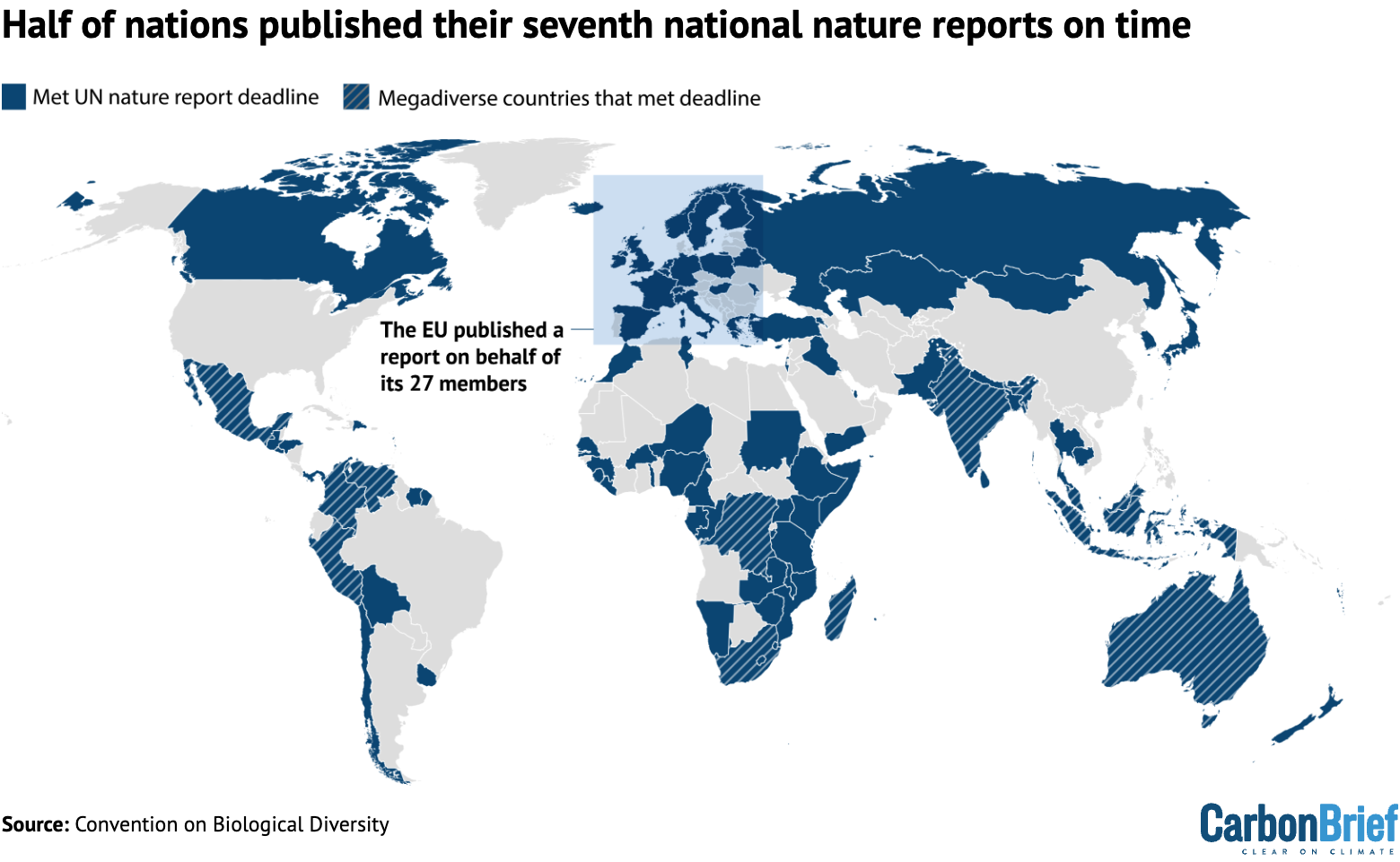
This includes 11 of the 17 “megadiverse nations” that account for 70% of Earth’s biodiversity.
The megadiverse nations to meet the deadline were India, Venezuela, Indonesia, Madagascar, Peru, Malaysia, South Africa, Colombia, Mexico, the Democratic Republic of the Congo and Australia.
It also includes all of the G7 nations (France, Germany, the UK, Japan, Italy and Canada), excluding the US, which has never ratified the Convention on Biological Diversity.
The UK’s seventh national report shows that it is currently on track to meet just three of the GBF’s 23 targets.
This is according to a LinkedIn post from Dr David Cooper, former executive secretary of the CBD and current chair of the UK’s Joint Nature Conservation Committee, which coordinated the UK’s seventh national report,
The report shows the UK is not on track to meet one of the headline targets of the GBF, which is to protect 30% of land and sea for nature by 2030.
It reports that the proportion of land protected for nature is 7% in England, 18% in Scotland and 9% in Northern Ireland. (The figure is not given for Wales.)
National plans
In addition to the national reports, the upcoming global report and review will draw on countries’ national plans.
Countries were meant to have submitted their new national plans, known as “national biodiversity strategies and action plans” (NBSAPs), by the start of COP16 in October 2024.
A joint investigation by Carbon Brief and the Guardian found that only 15% of member countries met that deadline.
Since then, the percentage of countries that have submitted a new NBSAP has risen to 39%.
According to the GBF and its underlying documents, countries that were “not in a position” to meet the deadline to submit NBSAPs ahead of COP16 were requested to instead submit national targets. These submissions simply list biodiversity targets that countries will aim for, without an accompanying plan for how they will be achieved.
As of 2 March, 78% of nations had submitted national targets.
At biodiversity talks in Rome in February, UN officials said that national reports submitted late will not be included in the global report due to a lack of time, but could still be considered in the global review.
Funding ‘delays’
At the Rome talks, some countries raised that they had faced “difficulties in submitting [their national reports] on time”, according to the Earth Negotiations Bulletin.
Speaking on behalf of “many” countries, Fiji said that there had been “technical and financial constraints faced by parties” in the preparation of their seventh national reports.
In a statement to Carbon Brief, a spokesperson for the Global Environment Facility, the body in charge of providing financial and technical assistance to countries for the preparation of their national reports, said “delays in fund disbursement have occurred in some cases”, adding:
“In 2023, the GEF council approved support for the development of NBSAPs and the seventh national reports for all 139 eligible countries that requested assistance. This includes national grants of up to $450,000 per country and $6m in global technical assistance delivered through the UN Development Programme and UN Environment Programme.
“As of the end of January 2026, all 139 participating countries had benefited from technical assistance and 93% had accessed their national grants, with 11 countries yet to receive their funds. Delays in fund disbursement have occurred in some cases, compounded by procurement challenges and limited availability of technical expertise.”
The spokesperson added that the fund will “continue to engage closely with agencies and countries to support timely completion of NBSAPs and the seventh national reports”.
The post Analysis: Half of nations meet UN deadline for nature-loss reporting appeared first on Carbon Brief.
Analysis: Half of nations meet UN deadline for nature-loss reporting
Greenhouse Gases
DeBriefed 27 February 2026: Trump’s fossil-fuel talk | Modi-Lula rare-earth pact | Is there a UK ‘greenlash’?
Welcome to Carbon Brief’s DeBriefed.
An essential guide to the week’s key developments relating to climate change.
This week
Absolute State of the Union
‘DRILL, BABY’: US president Donald Trump “doubled down on his ‘drill, baby, drill’ agenda” in his State of the Union (SOTU) address, said the Los Angeles Times. He “tout[ed] his support of the fossil-fuel industry and renew[ed] his focus on electricity affordability”, reported the Financial Times. Trump also attacked the “green new scam”, noted Carbon Brief’s SOTU tracker.
COAL REPRIEVE: Earlier in the week, the Trump administration had watered down limits on mercury pollution from coal-fired power plants, reported the Financial Times. It remains “unclear” if this will be enough to prevent the decline of coal power, said Bloomberg, in the face of lower-cost gas and renewables. Reuters noted that US coal plants are “ageing”.
OIL STAY: The US Supreme Court agreed to hear arguments brought by the oil industry in a “major lawsuit”, reported the New York Times. The newspaper said the firms are attempting to head off dozens of other lawsuits at state level, relating to their role in global warming.
SHIP-SHILLING: The Trump administration is working to “kill” a global carbon levy on shipping “permanently”, reported Politico, after succeeding in delaying the measure late last year. The Guardian said US “bullying” could be “paying off”, after Panama signalled it was reversing its support for the levy in a proposal submitted to the UN shipping body.
Around the world
- RARE EARTHS: The governments of Brazil and India signed a deal on rare earths, said the Times of India, as well as agreeing to collaborate on renewable energy.
- HEAT ROLLBACK: German homes will be allowed to continue installing gas and oil heating, under watered-down government plans covered by Clean Energy Wire.
- BRAZIL FLOODS: At least 53 people died in floods in the state of Minas Gerais, after some areas saw 170mm of rain in a few hours, reported CNN Brasil.
- ITALY’S ATTACK: Italy is calling for the EU to “suspend” its emissions trading system (ETS) ahead of a review later this year, said Politico.
- COOKSTOVE CREDITS: The first-ever carbon credits under the Paris Agreement have been issued to a cookstove project in Myanmar, said Climate Home News.
- SAUDI SOLAR: Turkey has signed a “major” solar deal that will see Saudi firm ACWA building 2 gigawatts in the country, according to Agence France-Presse.
$467 billion
The profits made by five major oil firms since prices spiked following Russia’s invasion of Ukraine four years ago, according to a report by Global Witness covered by BusinessGreen.
Latest climate research
- Claims about the “fingerprint” of human-caused climate change, made in a recent US Department of Energy report, are “factually incorrect” | AGU Advances
- Large lakes in the Congo Basin are releasing carbon dioxide into the atmosphere from “immense ancient stores” | Nature Geoscience
- Shared Socioeconomic Pathways – scenarios used regularly in climate modelling – underrepresent “narratives explicitly centring on democratic principles such as participation, accountability and justice” | npj Climate Action
(For more, see Carbon Brief’s in-depth daily summaries of the top climate news stories on Monday, Tuesday, Wednesday, Thursday and Friday.)
Captured
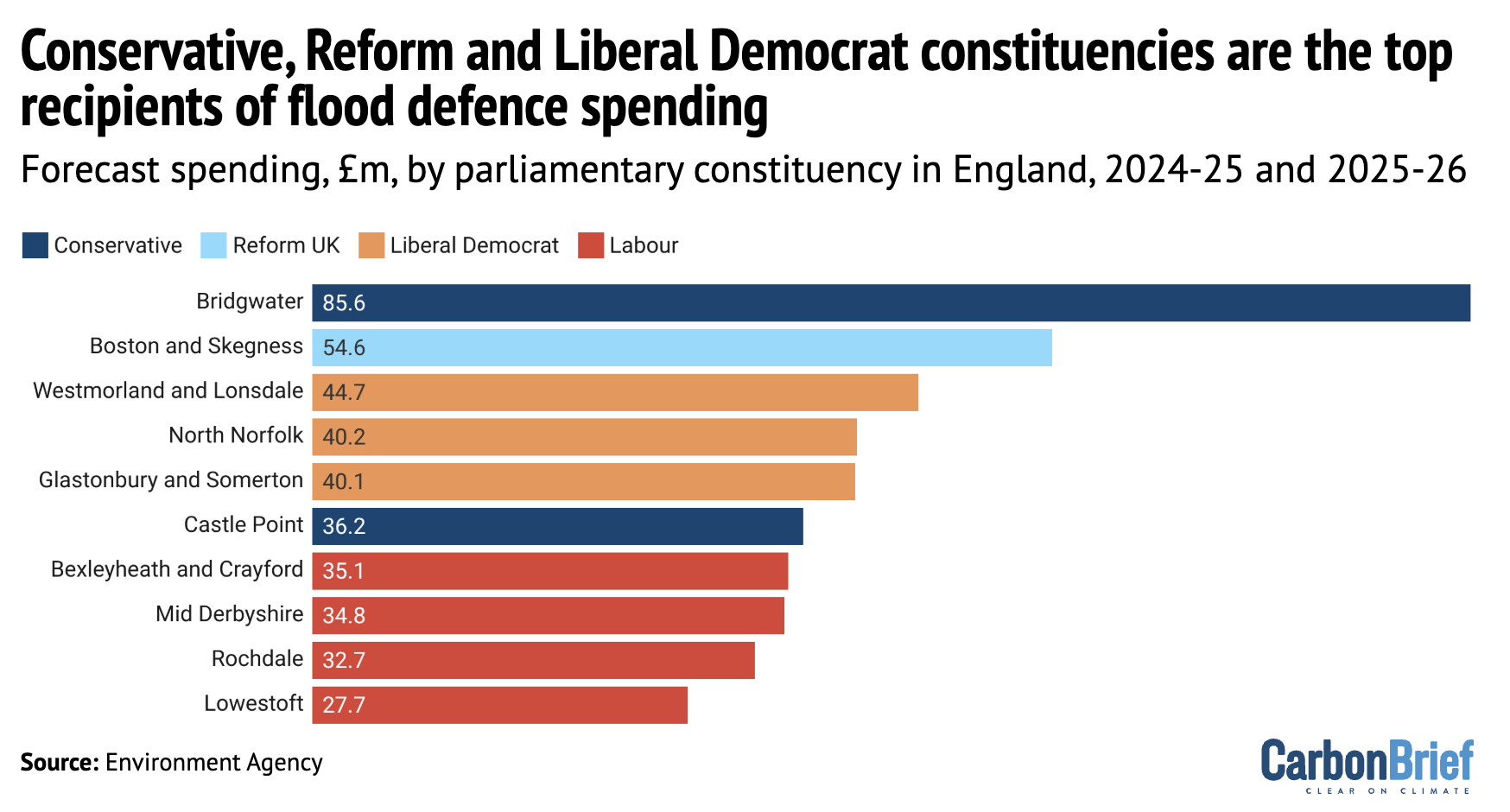
The constituency of Richard Tice MP, the climate-sceptic deputy leader of Reform UK, is the second-largest recipient of flood defence spending in England, according to new Carbon Brief analysis. Overall, the funding is disproportionately targeted at coastal and urban areas, many of which have Conservative or Liberal Democrat MPs.
Spotlight
Is there really a UK ‘greenlash’?
This week, after a historic Green Party byelection win, Carbon Brief looks at whether there really is a “greenlash” against climate policy in the UK.
Over the past year, the UK’s political consensus on climate change has been shattered.
Yet despite a sharp turn against climate action among right-wing politicians and right-leaning media outlets, UK public support for climate action remains strong.
Prof Federica Genovese, who studies climate politics at the University of Oxford, told Carbon Brief:
“The current ‘war’ on green policy is mostly driven by media and political elites, not by the public.”
Indeed, there is still a greater than two-to-one majority among the UK public in favour of the country’s legally binding target to reach net-zero emissions by 2050, as shown below.
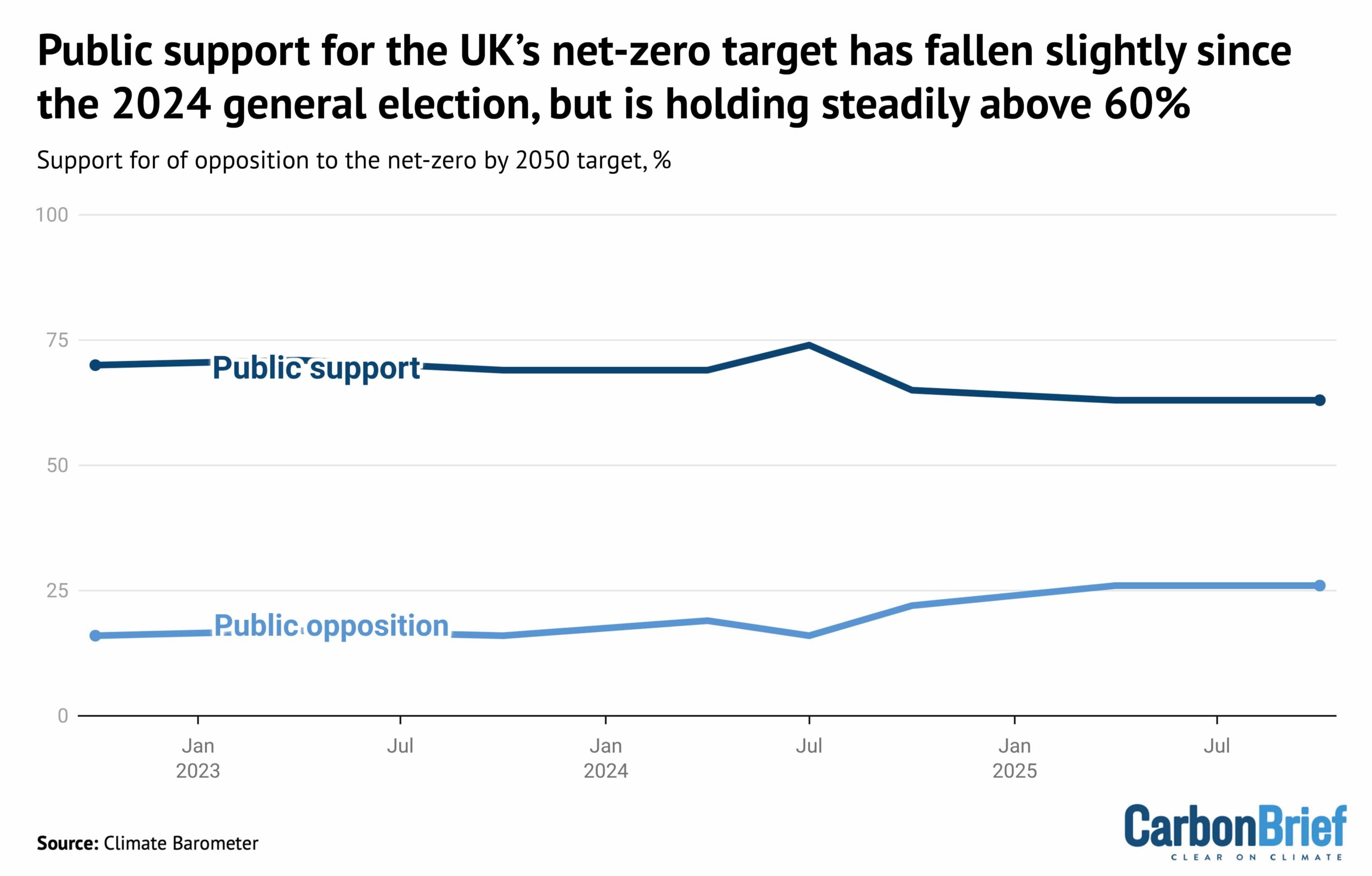
Steve Akehurst, director of public-opinion research initiative Persuasion UK, also noted the growing divide between the public and “elites”. He told Carbon Brief:
“The biggest movement is, without doubt, in media and elite opinion. There is a bit more polarisation and opposition [to climate action] among voters, but it’s typically no more than 20-25% and mostly confined within core Reform voters.”
Conservative gear shift
For decades, the UK had enjoyed strong, cross-party political support for climate action.
Lord Deben, the Conservative peer and former chair of the Climate Change Committee, told Carbon Brief that the UK’s landmark 2008 Climate Change Act had been born of this cross-party consensus, saying “all parties supported it”.
Since their landslide loss at the 2024 election, however, the Conservatives have turned against the UK’s target of net-zero emissions by 2050, which they legislated for in 2019.
Curiously, while opposition to net-zero has surged among Conservative MPs, there is majority support for the target among those that plan to vote for the party, as shown below.
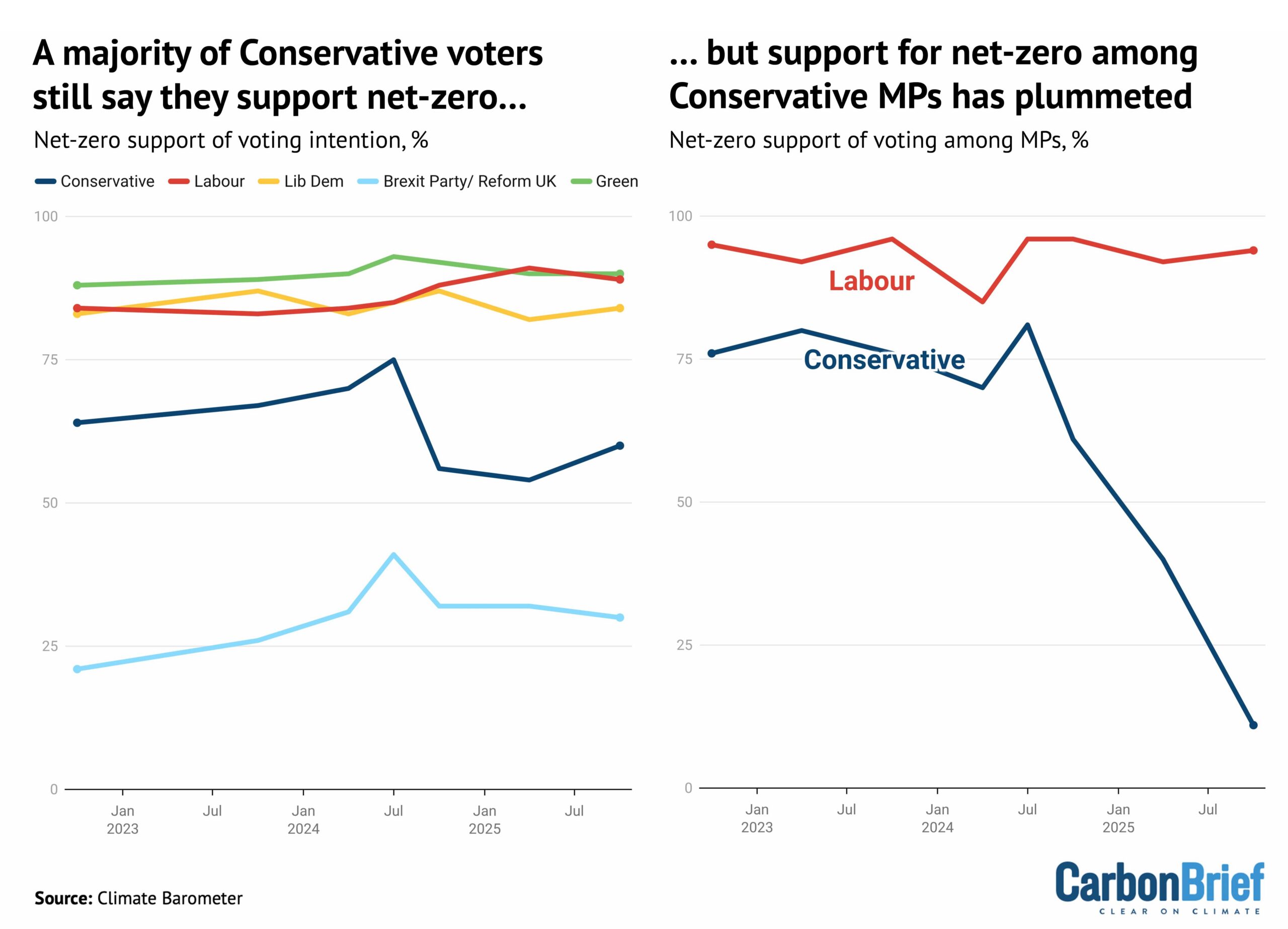
Dr Adam Corner, advisor to the Climate Barometer initiative that tracks public opinion on climate change, told Carbon Brief that those who currently plan to vote Reform are the only segment who “tend to be more opposed to net-zero goals”. He said:
“Despite the rise in hostile media coverage and the collapse of the political consensus, we find that public support for the net-zero by 2050 target is plateauing – not plummeting.”
Reform, which rejects the scientific evidence on global warming and campaigns against net-zero, has been leading the polls for a year. (However, it was comfortably beaten by the Greens in yesterday’s Gorton and Denton byelection.)
Corner acknowledged that “some of the anti-net zero noise…[is] showing up in our data”, adding:
“We see rising concerns about the near-term costs of policies and an uptick in people [falsely] attributing high energy bills to climate initiatives.”
But Akehurst said that, rather than a big fall in public support, there had been a drop in the “salience” of climate action:
“So many other issues [are] competing for their attention.”
UK newspapers published more editorials opposing climate action than supporting it for the first time on record in 2025, according to Carbon Brief analysis.
Global ‘greenlash’?
All of this sits against a challenging global backdrop, in which US president Donald Trump has been repeating climate-sceptic talking points and rolling back related policy.
At the same time, prominent figures have been calling for a change in climate strategy, sold variously as a “reset”, a “pivot”, as “realism”, or as “pragmatism”.
Genovese said that “far-right leaders have succeeded in the past 10 years in capturing net-zero as a poster child of things they are ‘fighting against’”.
She added that “much of this is fodder for conservative media and this whole ecosystem is essentially driving what we call the ‘greenlash’”.
Corner said the “disconnect” between elite views and the wider public “can create problems” – for example, “MPs consistently underestimate support for renewables”. He added:
“There is clearly a risk that the public starts to disengage too, if not enough positive voices are countering the negative ones.”
Watch, read, listen
TRUMP’S ‘PETROSTATE’: The US is becoming a “petrostate” that will be “sicker and poorer”, wrote Financial Times associate editor Rana Forohaar.
RHETORIC VS REALITY: Despite a “political mood [that] has darkened”, there is “more green stuff being installed than ever”, said New York Times columnist David Wallace-Wells.
CHINA’S ‘REVOLUTION’: The BBC’s Climate Question podcast reported from China on the “green energy revolution” taking place in the country.
Coming up
- 2-6 March: UN Food and Agriculture Organization regional conference for Latin America and Caribbean, Brasília
- 3 March: UK spring statement
- 4-11 March: China’s “two sessions”
- 5 March: Nepal elections
Pick of the jobs
- The Guardian, senior reporter, climate justice | Salary: $123,000-$135,000. Location: New York or Washington DC
- China-Global South Project, non-resident fellow, climate change | Salary: Up to $1,000 a month. Location: Remote
- University of East Anglia, PhD in mobilising community-based climate action through co-designed sports and wellbeing interventions | Salary: Stipend (unknown amount). Location: Norwich, UK
- TABLE and the University of São Paulo, Brazil, postdoctoral researcher in food system narratives | Salary: Unknown. Location: Pirassununga, Brazil
DeBriefed is edited by Daisy Dunne. Please send any tips or feedback to debriefed@carbonbrief.org.
This is an online version of Carbon Brief’s weekly DeBriefed email newsletter. Subscribe for free here.
The post DeBriefed 27 February 2026: Trump’s fossil-fuel talk | Modi-Lula rare-earth pact | Is there a UK ‘greenlash’? appeared first on Carbon Brief.
Greenhouse Gases
Analysis: Constituency of Reform’s climate-sceptic Richard Tice gets £55m flood funding
The Lincolnshire constituency held by Richard Tice, the climate-sceptic deputy leader of the hard-right Reform party, has been pledged at least £55m in government funding for flood defences since 2024.
This investment in Boston and Skegness is the second-largest sum for a single constituency from a £1.4bn flood-defence fund for England, Carbon Brief analysis shows.
Flooding is becoming more likely and more extreme in the UK due to climate change.
Yet, for years, governments have failed to spend enough on flood defences to protect people, properties and infrastructure.
The £1.4bn fund is part of the current Labour government’s wider pledge to invest a “record” £7.9bn over a decade on protecting hundreds of thousands of homes and businesses from flooding.
As MP for one of England’s most flood-prone regions, Tice has called for more investment in flood defences, stating that “we cannot afford to ‘surrender the fens’ to the sea”.
He is also one of Reform’s most vocal opponents of climate action and what he calls “net stupid zero”. He denies the scientific consensus on climate change and has claimed, falsely and without evidence, that scientists are “lying”.
Flood defences
Last year, the government said it would invest £2.65bn on flood and coastal erosion risk management (FCERM) schemes in England between April 2024 and March 2026.
This money was intended to protect 66,500 properties from flooding. It is part of a decade-long Labour government plan to spend more than £7.9bn on flood defences.
There has been a consistent shortfall in maintaining England’s flood defences, with the Environment Agency expecting to protect fewer properties by 2027 than it had initially planned.
The Climate Change Committee (CCC) has attributed this to rising costs, backlogs from previous governments and a lack of capacity. It also points to the strain from “more frequent and severe” weather events, such as storms in recent years that have been amplified by climate change.
However, the CCC also said last year that, if the 2024-26 spending programme is delivered, it would be “slightly closer to the track” of the Environment Agency targets out to 2027.
The government has released constituency-level data on which schemes in England it plans to fund, covering £1.4bn of the 2024-26 investment. The other half of the FCERM spending covers additional measures, from repairing existing defences to advising local authorities.
The map below shows the distribution of spending on FCERM schemes in England over the past two years, highlighting the constituency of Richard Tice.
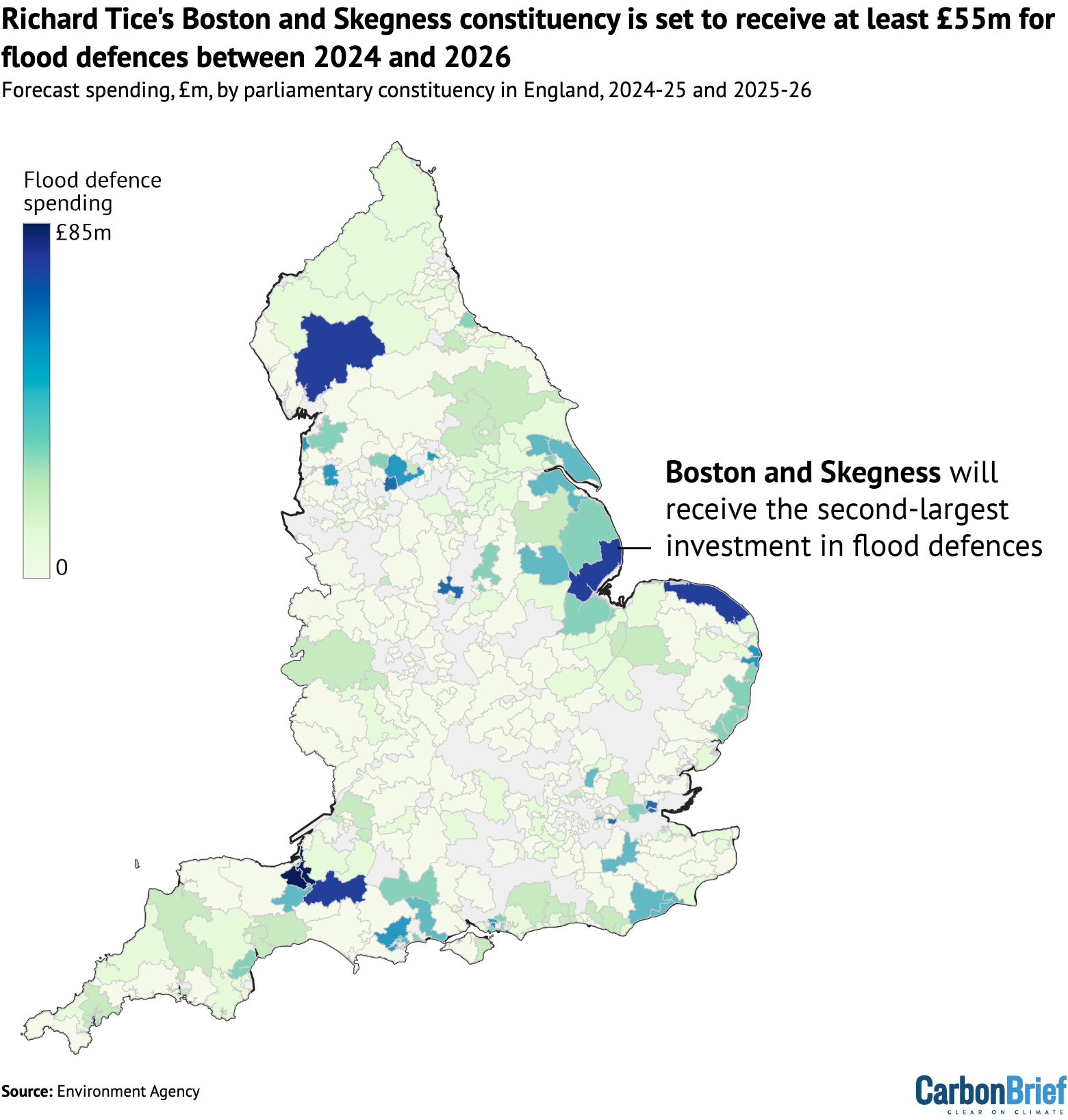
By far the largest sum of money – £85.6m in total – has been committed to a tidal barrier and various other defences in the Somerset constituency of Bridgwater, the seat of Conservative MP Ashley Fox.
Over the first months of 2026, the south-west region has faced significant flooding and Fox has called for more support from the government, citing “climate patterns shifting and rainfall intensifying”.
He has also backed his party’s position that “the 2050 net-zero target is impossible” and called for more fossil-fuel extraction in the North Sea.
Tice’s east-coast constituency of Boston and Skegness, which is highly vulnerable to flooding from both rivers and the sea, is set to receive £55m. Among the supported projects are beach defences from Saltfleet to Gibraltar Point and upgrades to pumping stations.
Overall, Boston and Skegness has the second-largest portion of flood-defence funding, as the chart below shows. Constituencies with Conservative and Liberal Democrat MPs occupied the other top positions.
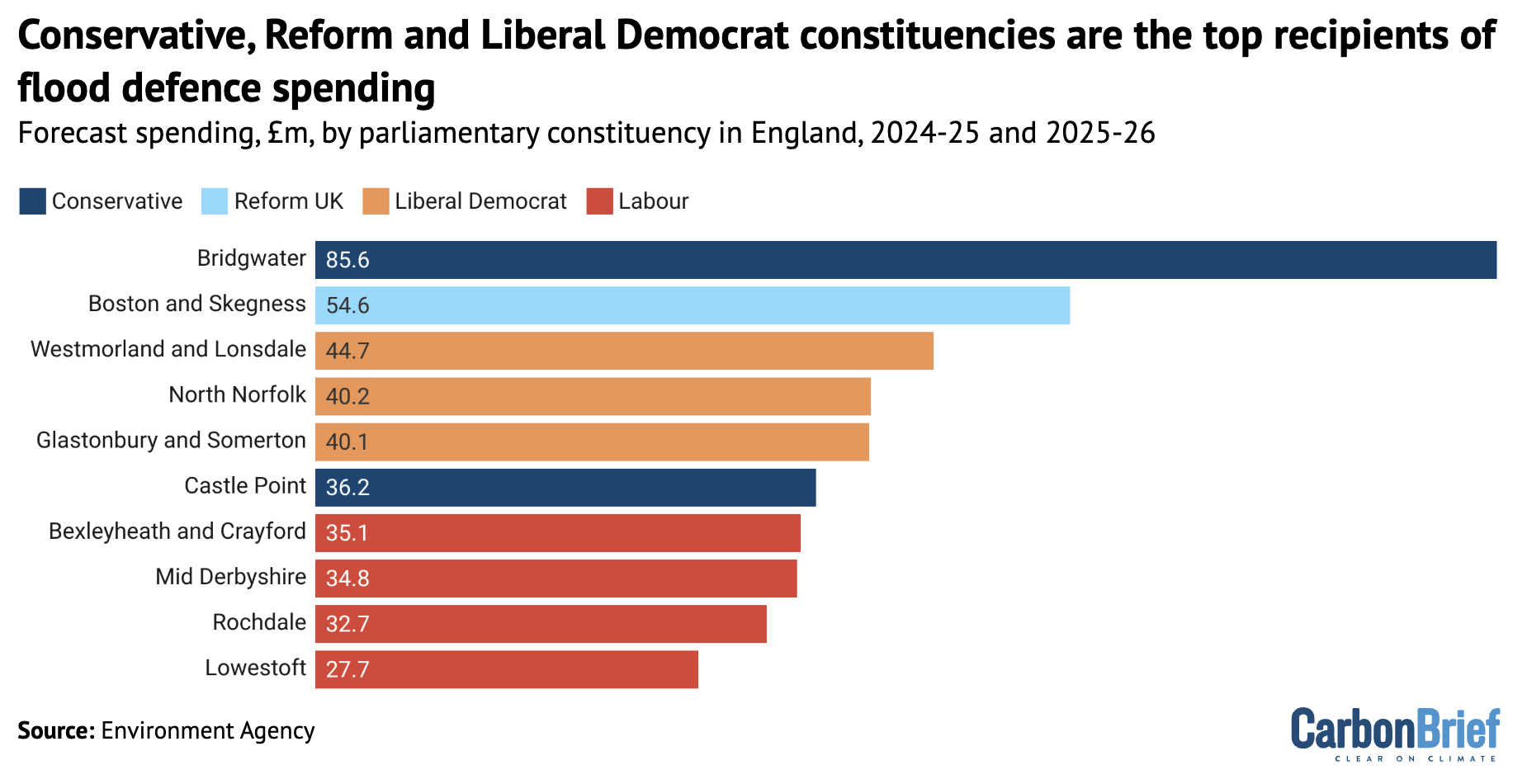
Overall, despite Labour MPs occupying 347 out of England’s 543 constituencies – nearly two-thirds of the total – more than half of the flood-defence funding was distributed to constituencies with non-Labour MPs. This reflects the flood risk in coastal and rural areas that are not traditional Labour strongholds.
Reform funding
While Reform has just eight MPs, representing 1% of the population, its constituencies have been assigned 4% of the flood-defence funding for England.
Nearly all of this money was for Tice’s constituency, although party leader Nigel Farage’s coastal Clacton seat in Kent received £2m.
Reform UK is committed to “scrapping net-zero” and its leadership has expressed firmly climate-sceptic views.
Much has been made of the disconnect between the party’s climate policies and the threat climate change poses to its voters. Various analyses have shown the flood risk in Reform-dominated areas, particularly Lincolnshire.
Tice has rejected climate science, advocated for fossil-fuel production and criticised Environment Agency flood-defence activities. Yet, he has also called for more investment in flood defences, stating that “we cannot afford to ‘surrender the fens’ to the sea”.
This may reflect Tice’s broader approach to climate change. In a 2024 interview with LBC, he said:
“Where you’ve got concerns about sea level defences and sea level rise, guess what? A bit of steel, a bit of cement, some aggregate…and you build some concrete sea level defences. That’s how you deal with rising sea levels.”
While climate adaptation is viewed as vital in a warming world, there are limits on how much societies can adapt and adaptation costs will continue to increase as emissions rise.
The post Analysis: Constituency of Reform’s climate-sceptic Richard Tice gets £55m flood funding appeared first on Carbon Brief.
Analysis: Constituency of Reform’s climate-sceptic Richard Tice gets £55m flood funding
-
Greenhouse Gases7 months ago
Guest post: Why China is still building new coal – and when it might stop
-
Climate Change7 months ago
Guest post: Why China is still building new coal – and when it might stop
-

 Greenhouse Gases2 years ago
Greenhouse Gases2 years ago嘉宾来稿:满足中国增长的用电需求 光伏加储能“比新建煤电更实惠”
-
Climate Change2 years ago
Bill Discounting Climate Change in Florida’s Energy Policy Awaits DeSantis’ Approval
-
Climate Change2 years ago
Spanish-language misinformation on renewable energy spreads online, report shows
-

 Climate Change2 years ago
Climate Change2 years ago嘉宾来稿:满足中国增长的用电需求 光伏加储能“比新建煤电更实惠”
-
Climate Change Videos2 years ago
The toxic gas flares fuelling Nigeria’s climate change – BBC News
-

 Carbon Footprint2 years ago
Carbon Footprint2 years agoUS SEC’s Climate Disclosure Rules Spur Renewed Interest in Carbon Credits




